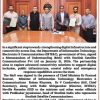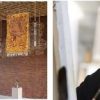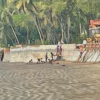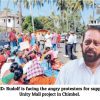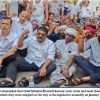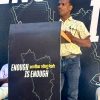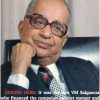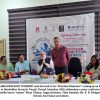Goa is abuzz with excitement as vintage bike and car owners, users, collectors and fans are decking […]
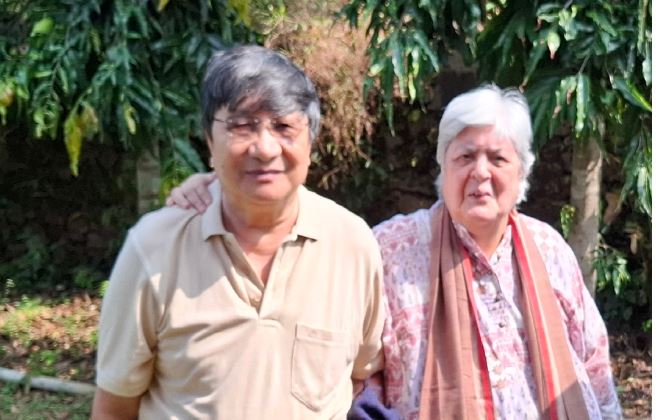
WHAT IS NATIONALISM TODAY?
BOOK REVIEW, Nov 16- Nov 22 2024 November 15, 2024`The Colours of Nationalism, A Memoir of Dreams, Hopes and Betrayals’ by Nandita Haksar, published by Speaking Tiger, softcover, Rs599
CHUCK social media. Read Nandita Haksar’s “The Colours of Nationalism, A Memoir of Dreams, Hopes and Betrayals” by Nandita Haksar today! We must get back to reading books, real books. This one is an important book to read regardless of how old or young you are. Nandita Haksar’s aptly titled “The Colours of Nationalism, A Memoir of Dreams, Hopes and Betrayals” is a book I found myself reading in bits and pieces and then thoroughly to see how enchanting and disenchanting life can be through one woman’s eyes – the woman is Nandita Haksar (proud to say she’s a friend of mine).
The question arises after reading such an awesome treat of a book – at once personal autobiography as also a narrative of modern Indian history of the very best kind – what were the colours of nationalism yesterday, and what are they today?
You want to read this book to understand so much of what happened 75 years ago and what has been happening for the last 14 years and more. Here’s a refreshing autobiography that for a while may stop one breathing or bursting into tears for the waste and the want which plagues the country today…India, which seeks to become Bharat.
Nandita Haksar’s latest book should be read by everyone if only in loving memory of their parents. Today’s gen next too should read to understand how in the old days of seeking freedom from British colonial rule parents brought up children to be Indians first. As Nandita Haksar’s parents did, and that defined both nationalism and patriotism.
Parents make a difference to how children grow up thinking and this gets reiterated every now and again reading this soft, warm-hearted autobiography; at once personal as professional as in chapter after chapter she shares her love for a country which is so diverse that unity keeps eluding it, unity in diversity is after all every Indian seeking happy relationships in the India of many dreams.
We Indians are special in a world increasingly losing its special-ness. This is a painstakingly put together memoir evoking pain and grief — that perhaps the India so many of us grew up in is fading if not dead already with more nails being hammered into its coffin of democracy!
Nandita Haksar’s story unfolds through the eyes of a passionate Indian as she recounts personal anecdotes of her life in which the idea of an India is an ideal millions fought and died for…has it all been in vain? Is India being killed by those who should know better? The questions arise as one continues to read this compelling autobiography for out times.
I’ve never been so caught up in a book but this one is a cherished story as only one of the country’s bravest human rights lawyer, campaigner, teacher and writer – Nandita Haksar – can tell it. She merges her own story with the stories of so many others which pertinent and worth appreciating. Reading Nandita Haksar’s “The Colours of Nationalism, A Memoir of Dreams, Hopes and Betrayals” leaves me feeling truly bereft, wondering if the colors of India have truly paled beyond recovery?
How many are fighting the good fight to retain India as “a sovereign socialist secular democratic republic committed to justice, equality and liberty” for all its people? This book jogs our memories as it details step by step how India got its freedom on August 15, 1947 and some 75 years later where have we arrived…remember Nandita Haksar is the eldest daughter of Urmila and Parmeshwar Narain Haksar. PN Haksar who started off as a diplomat working in the Indian High Commissioner in London (where Nandita was born) and later served Prime Minister Indira Gandhi as her principal secretary. Her parents were socialist in their thinking, says Nandita, right through her growing up years they instilled in her that she was a child of a free India. Her parents sailed back from London to India on her first birthday…and from then onwards we get a lively account of growing up, uncertain adventures and the legal battles she fought. To be the author of 20 books now, all of them documenting voices that are seldom heard, be they be the voices of ordinary working people, migrants or aspirants seeking to live peacefully and fruitfully in India.
The author has dedicated her life to documenting the life and times of what so many of us perceive as the other India – the larger India of the less privileged, the poorer India of people still struggling to make ends meet, whose lives many of us may have lost touch with. Given today’s dynamics of utopia versus dystopia, when one to 10 percent make it up the ladder of fame and fortune to call the shots of development and progress – in whose interests if not in the interests of khaas aadmi first, leaving a few crumbs for aam aadmi?)
Nandita Haksar writes with quiet sensitivity about the promise of the “tiranga” for all Indians, then the “different shades of red” as she got involved in political activism for larger and smaller causes, her “saffron encounters”…in the chapter titled The Colour Purple she recounts how she became a feminist, a human rights lawyer when it was hard work distinguishing black from white… “the colours of power” are indeed, rainbow coloured but soon cease to be as even lawyers grow up to the realities of what it takes to fight for the poor and damned, “In any case, my experience of the law had convinced me that it could never be instrument for change or liberation. It was essentially an instrument to help maintain the status quo – to uphold patriarchy, the caste system, class divisions and racism. What I liked most about being a human rights lawyer was that it allowed me to take sides. And I had chosen to stand by the side of the economically poor, the politically disenfranchised.”
In her private and public life one gets to see how life turns into “rainbow chaos” in the search for unity in diversity…even for the north-eastern people of Assam, Manipur, Nagaland, Arunachal Pradesh, especially Nagaland — a state she has close links and intimate knowledge of (being married to Sebastian Hongray from Nagaland)… in between fighting for the rights of Indians be they in Delhi or in far-flung Nagaland, Nandita Haksar weaves in her joys, dilemmas and sorrows of life. This is what makes “The Colours of Nationalism” so readable, it covers a gamut of familiar to half-forgotten Indian political history good, bad and terribly ugly.
This is my “unputdownable” book of 2024 to appreciate the life and times of a profoundly hard-working human being, a woman who has enjoyed and rued the comic and tragic in real life stories as they opened and closed. There are no double standards here between private and public life; one of my favorite authors of India continues to live the last of life with unfailing determination — through ill-health and to triumph above all, as she tells you about dreams, hopes, of a country which sought freedom in the name of every Indian…one may well ask where is that freedom now? Is it being torn asunder with betrayals by those who have little idea of what good fights are all about when it comes to a civilization both ancient and modern?
Thank-you Nandita Haksar, for sharing the magnificent story of your life! This story deserves to be read in a myriad other languages and here’s a book which definitely lends itself to being turned into a film.
Excerpts from ‘The Colours of Nationalism, a Memoir of Dreams, Hopes and Betrayals’ by Nandita Haksar…
The Promise of the Tiranga
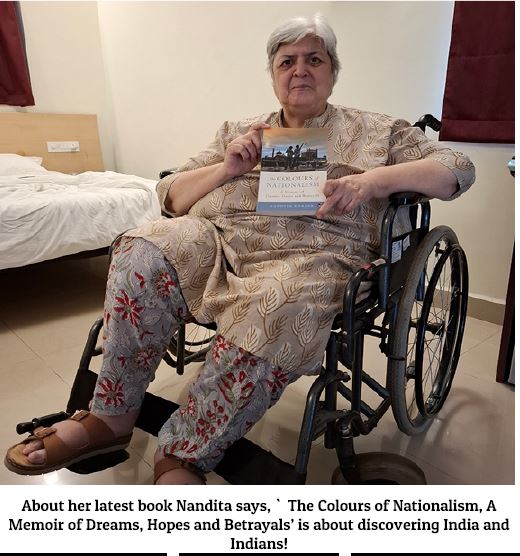
Rajendra Narain Haksar (1803-1982)
My Dada was a rare combination of tradition and a reluctant iconoclasm. Popularly known as Inder Bhai, he opened a shop called Pandit brothers in Lahore which, after the Partition, moved to Chandni Chowk, where he would sit on a pristine white sheet spread over a low takht, leaning on bolster pillows entertaining poets and singers. Like most men in the Kashmiri Pandit community he had a passion for Urdu and Persian poetry. He was the first Kashmiri Brahmin to open a shop in Delhi, in defiance of all tradition. Kashmiri Pandits looked down on trading as a profession and preferred government service or professions such as teaching, law or engineering.
Later, he opened another branch of the shop in F block of Connaught Place. This shop was modern, with the salemen standing behind counters instead of sitting on a takht. Dada was tall and ramrod straight and had a b ig moustache. He would sit in a corner, always looking dignified in his starched white kurta pyjama, the sleeves of the kurta, which had tiny gold buttons, meticulously crimped (chunnat-ed) by a dhoti. He always welcomed me with a big smile, a bristly peck on my cheek and a warm hug. He had sofas and chairs with bookshelves behind him.,
The books included a translation of the Rajatarangini, or the River of Kings,’ by Pandit Kalhana, which is the earliest history Kashmir written in Sanskrit between 1148 and 1150 AD. Dada had the translation done by Ranjit Sitaram Pandit, the husband of Vijaya Lakshmi Pandit, Nehru’s sister. Among Dada’s books were also those by Russian writers like Gorky and Pushkin; and Tagore and Stefan Zweig and Romain Rolland. Then there were books that were gifted to him. There was a copy of Lenin in Contemporary Indian Press presented by P.C. Joshi of the Communist Party of India, who had edited the book, and a slim volume called the Insult Dictionary: How to Be Abusive in Five Languages (1966). The latter was a gift to him by my father’s American friend, Daniel Thorner. Daniel knew of dada’s wicked sense of humour. But most part of the bookshelves were occupied by dictionaries. There was the 12-volume Oxford dictionary and varieties of Urdu and Persian dictionaries. Dada would discuss poetry threadbare with the poets who visited him, sometimes arguing for hours over the meaning or nuance of a single word in a particular verse just read out to him. I had often seen dada consult his dictionaries at such moments. For him the shop was really just an excuse to gather creative people around him! It was more reminiscent of a French salon than a place selling fabrics. I can still recall Dada at Pandit Brothers, surrounded by poets, musicians and writers. One of the persons I remember well was the elegant Naina Devi (1917-1993). Naina Devi was Nilina Sen, born to an aristocratic Bengali family in Calcutta. Her grandfather was Keshub Chandra Sen, nationalist leader and social reformer, a member of the Brahmo Samaj. She had been married off into some feudal family and it was only after her husband’s death that she moved to Delhi and started her career in music. One day a customer came in speaking chaste Urdu. Dada was drawn to him like a magnet. Putting his arm around the young man he asked him affectionately who he was and how he spoke such mellifluous Urdu.Mujhe Balraj Sahni kehte hain,’ the man replied. It was the famous communist actor and member of the Indian People’s Theatre Association, formed in 1943 by the Communist Party.
I loved my data dearly. Perhaps he was the only relative I truly loved. But I never understood how he could make donations to both the Rashtriya Swayamsevak Sangh and to the Communists. He said both were sincere.
When I visited him on Sundays in his rented home at 108 Babar Road, Bengali Market, there would often be this man we called Khan Sahib telling Dada Sufi stories. They seemed to me rather like children’s stories; I obviously did not understand their deeper meaning. Sometimes he sang Sufi songs. Unfortunately, I cannot remember the name of the man but he was there at Dada’s funeral and also at my mother’s memorial meeting, where he sang one of his own compositions.
Dada did not get married but he did have a companion, Nirmala Joshi. I do not know much about her except that her father was a doctor and he was killed during the violence of the Partition. By the time I first met her she was in pain, often unable to walk. Dada had a full-time nurse who used to give her injections. He loved her and called her Nimmo…..
The Different Shades of Red
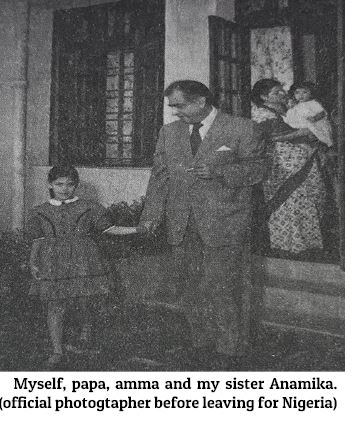
I was deeply moved by the stories I read about political prisoners, especially those who had been famed merely because of the colour of their skin or their religion. I read books on the trial of Nicola Sacco and Bartolomeo Vanzetti, whom Davis talked about in If They Come in the Morning. I also read about the Scottsboro Boys, African American teens accused of raping a white woman in 1931, and the injustice of the trial of Alger Hiss for disloyalty.
The book that made the deepest impression on me and moved me to the core of my being, however, was The Testament of Ethel and Julius Rosenberg, published in 1954. It was a compilation of letters the husband and wife wrote to each other and to their small sons while imprisoned, awaiting sentencing – knowing they could be sentenced to death. I can never forget the black-and-white photographs of the balding lawyer, Emanuel Bloch, who represented them at their trial, with an arm around their two small sons, ten-year-old Michael and six-year-old Robert, taken hours before their parents were executed on 19 June 1953.
Ethel and Julius Rosenberg were a Jewish couple from a working class Background. They were executed on the charge of stealing secrets relating to the atom bomb and giving it to the soviets. They were the first and only Americans ever to be put to death for espionage in civil court history. They said they were innocent. This is the last letter written by Ethel just before she and her husband were executed:
Dearest Sweethearts, my most precious children, Only this morning it looked like we might be together again after all. Now that this cannot be, I want to so much for you to know all that I have come to know. Unfortunately, I may write only a few simple words; the rest your own lives must teach you, even as mine taught me.
At first, of course, you will grieve bitterly for us, but you will not grieve alone. That is our consolation and it must eventually be yours.
Eventually, too you must come to believe that life is worth the living. Be comforted that even now, with the end of our slowly approaching, that we know this with a conviction that defeats the executioner!
Your lives must teach you too, that good cannot really flourish in the midst of evil; that freedom and all the things that go to make up a truly satisfying and worthwhile life, must sometimes be purchased very dearly. Be comforted then that we were serene and understood with the deepest kind of understanding, that civilisation had not as yet progressed to the point where life did not have to be lost for the sake of life; and that we were comforted in the sure knowledge that others would carry on after us.
We wish we might have had the tremendous joy and gratification of living our lives out with you. Your Daddy who is with me in these last momentous hours, sends his heart and all the love that is in it for his dearest boys. Always remember that we were innocent and could not wrong our conscience.
We press your close and kiss you with all our strength.
Lovingly,
DADDY AND MOMMY
JULIE ETHEL
Unlike the couple Emanuel Bloch represented in court, the person on death row whom I would defend years later as a human rights lawyer would not be a communist. In fact, Syed Abdul Rehman Geelani, the lecturer in Arabic at DU’s Zakir Hussain College, arrested in connection with the 2001 Indian Parliament attack, was someone who celebrated the disintegration of the Soviet Union.
The Colour Purple
Indira Gandhi (1917-1984)
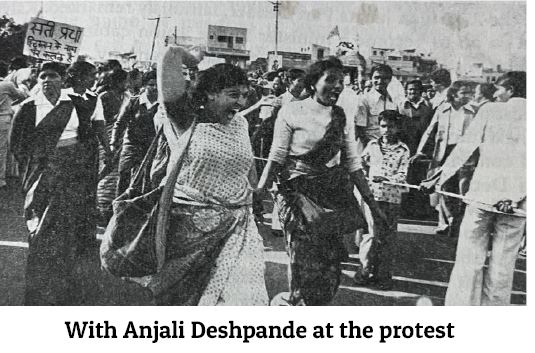
INDIRA Gandhi was not merely my father’s boss. He had known her as a student in London and looked out for her. In the 1960s, when Rajiv was dating Sonia, he had brought his Italian girlfriend to my parents. We were then in London and I remember we had all gone for a meal to a Spanish restaurant, Casa Pepe.
So, the vicious attack on him during the Emergency must have been painful for Papa. But he remained silent and kept his feelings bottled up, stoically going about his business. Some people thought he should have spoken out. But he felt silence would be the more eloquent way of showing his disapproval.
It was only after Papa died and I went through his papers before giving them to the Nehru Memorial Museum and Library that I realized why he had so tenaciously opposed Sanjay Gandhi. It was not just the car-building project that infuriated Papa. Indira Gandhi was allowing her son to destroy the foundation for a socialist India. I quote from his hand written notes about the rise of Sanjay Gandhi and his impact on the Congress party and even on other institutions of governance.
- Under the sign board of Congress a new political structure is being created. This structure has no base. On top of this structure one has two individuals, Indira Gandhi and Sanjay Gandhi.
- There is an army of individually recruited men and women who have large financial and other resources. They carry (out) whatever orders are given to them.
- Anyone who is suspected of not being loyal to the person of Indira Gandhi and Sanjay Gandhi is eliminated.
- The structure is being linked with (a) loyal bureaucracy…its tentacles reach out (the) coercive apparatus of Government of India and State governments.
In my diary from those days, I note that Papa had confessed that he had even contemplated committing suicide. It was only a passing thought, but it reflected his deep anguish and helplessness. And yet, despite all of it, my parents never allowed me to become embittered. I learned to understand politics dispassionately without bringing in personal likes and dislikes.
Living in a Rainbow Chaos
The Quiet Hero
ON New Year’s Eve, 1988-89, Sebastian and I were sitting in Aram Pamei’s room in the MBC compound sipping tea when a man walked in carrying a whole bunch of files with him. He was not very tall, portly, quiet and unassuming. He introduced himself as N. Surendra Singh, the sub-divisional officer of Paomata, a part of Senapati district in which Operation Bluebird had been the most intense.
The files he had with him were the internal correspondence between the various members of the district administration during the operation. While the Superintendent of Police and the Deputy Commissioner had been prevented from entering the villages where the Assam Rifles were conducting Operation Bluebird, Surendra Singh had managed to unobtrusively wander around the villages, writing notes on the horrors he witnessed. He wanted to be summoned by the court so he could put on record the things he had seen. Leaving all the files with me, he left quietly.
Just two days after Surendra Singh’s visit, on 3 January 1989, when we returned from the sessions court, Kotishwar told me that O. Joy, the MLa, wanted to see me urgently. I was a bit surprised, but since it was an unusual request, Kotishwar and I went, me riding pillion on Kotishwar’s two-wheeler.
O. Joy said he had reliable information that the Assam Rifles had given someone a contract to assassinate me. I remember the day because it was on the same day that I had read of Safdar Hashmi’s murder. Later, he told me that the contract had been given to an ex-militant who refused to carry out the task when he learnt his target was a woman human rights lawyer.
No news remains hidden in Manipur for long.
Back Home
THE years spend in the Northeast had enriched my understanding of the region but all my memoires were good. All the months I was in Manipur I was reminded that I was a Mayan, an Indian who did not belong there. Not that this necessarily translated into hostility. On the contrary, I was a bit of a celebrity – a Mayang fighting the Indian security forces. The people who treated me with suspicion and hostility were other Indians, namely the Assam Rifles. On one occasion, one officer even asked me how I could work for these people who ate cows and buffaloes.
The unpleasantness I’m talking about pertains to some things I witnessed during my stay in the Manipur Baptist Church compound, sharing a room with an evangelist, Aram Pamei, the woman who had accompanied me to Oinam before the court hearings.
Aram Pamei was a Naga from Tamenglong district and belonged to the Rongmei community. She had a degree in theology from the eastern theological college at Jorhat and later went on to study at Bangalore’s prestigious United Theological College, established way back in 1910 (through the co-operation of the London Missionary Society, the Wesleyan Methodist Missionary Society, the United Free Church of Scotland, the Arcot Mission of the Reformed Church in America and the Trustees of the Jaffna College Funds). When I first met Aram, she had recently returned from South Korea where she had gone for a special course in theology.
Aram once confessed she wanted to do her PhD on feminist theology and I presented her with the woman’s Bible which I had bought for her in New York, when I had gone there to lobby with the UNHRC. The woman’s Bible was a two-part re-interpretation of the bible by Elizabeth Cady Stanton and a committee of 26 women, published in 1895 and 1898, to challenge the traditional position of religious orthodoxy that woman is to be subservient to an. But Aram’s superiors did not approve of the subject she wished to study for her doctorate. Besides, they were upset with her for not only supporting the human rights cause but harbouring a pagan without being able to convert her.
Aram could not understand my views on religion. One day, she found the Deputy Commissioner’s wife and I celebrating Eid by making vermicelli; neither of us were Muslim. Aram thought I was perhaps attracted to Islam so she presented me with a book written a Pakistani Muslim woman who had converted to Christianity, Begum Bilquis Sheikh’s I Dared to Call Him Father (1978). It had sold millions of copies and I now had one in my hand the Christian literature I found in her room shocked me because it preached a hatred of Jews, communists, and most of all, Catholics. A poster in her room by the Northeast India Harvest Network exhorted the Baptists to convert the unreached people.’
Just before coming to Imphal, I had been to the Philippines in March 1988, where I was invited to chair the first international tribunal on human rights violations. During the visit I had interacted with members of the ecumenical Movement for Peace and Justice militarization of their country. The same year I went to Nicaragua, and for the first time learnt about Liberation theology and how priests had worked alongside the communists and even joined in the armed struggle led by the Sandinista National Liberation Front. These priests had defied the Catholic Church which supported the Somoza family dictatorship.
I did not see anything liberating about the theology being practiced by the Manipur Baptist Church. Far from fighting for the rights of the poor, they were reluctant to even support the human rights work we were doing. It was only Aram w ho had the courage of her convictions, who put all her resources at the disposal of the activists who had made her room their headquarters.
In the beginning, I was amused by Aram’s attempts to bring me to the faith. But, as he efforts to convert me became more persistent, I finally told Luingam Luithui what was happening and let him know I could not stay in the church compound any longer. I still remember his response:I had warned them not to do that.’
What I did not know then was that nearly every Naga village had passed a resolution not to have more than one Christian denomination. In 2017, the resolution banning all denominations except Baptists, passed in 1973 in one Tangkhul village, would be invoked and a Catholic husband would not be allowed to bury his own wife. When I spoke out against this intolerance, I was told I was defending the Catholics because I had married a catholic. But mine was a civil marriage; and I did not hold a brief for the Catholic Church.
Sebastian and I, along with his younger brother, had subsequently moved to a small house in Langol. It had one small living room and one bathroom, one toilet and a kitchen. We had a small garden in front and a kitchen garden at the back. Langol was very beautiful, with lush paddy fields in front of us and the mountains behind us. I remember those months in Langol as my happiest in Manipur. The one problem Langol had was severe water shortage during the dry season. At one time, there would be a supply of water for one hour every three days.
On 3 and 4 May 2023, houses in Langol were set on fire by angry mobs. I remembered the silence of the nights there and the beauty all around as I watched videos of the neighbourhood engulfed in flames.
It was during my time there, probably sometime in the summer of 1990, that my father came to Imphal as the head of a committee appointed to look into the working of the cultural academies. He was staying in the Circuit House and Sebastian and I dropped in to see him one day. I used his bathroom, and when I came out, I exclaimed, `It’s so good to be able to wash both hands under the tap with running water.’ Papa did not understand what I was saying. I did not tell him that ever since I had come to Imphal I had always had to wash m one hand at a time holding a mug of water with the other. As I sat chatting t him that day, I knew we, Papa and I, now lived in two different Indias, two very different worlds. And I was a stranger in both.
